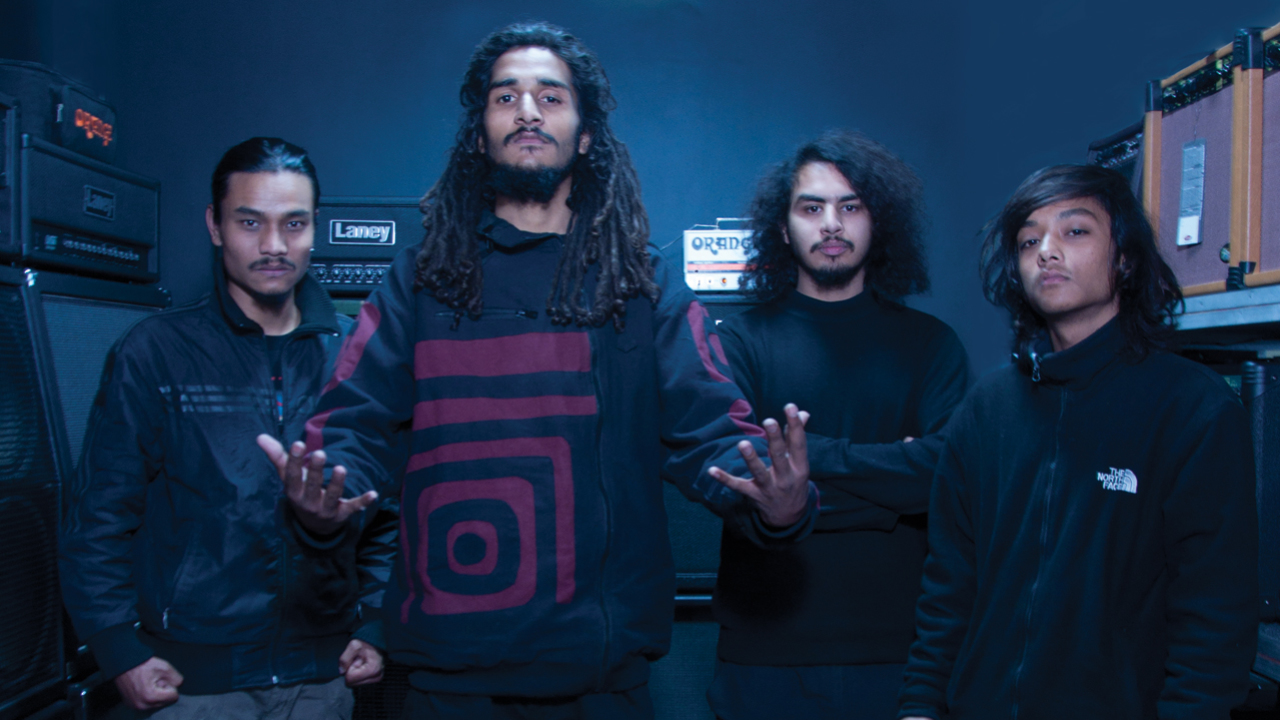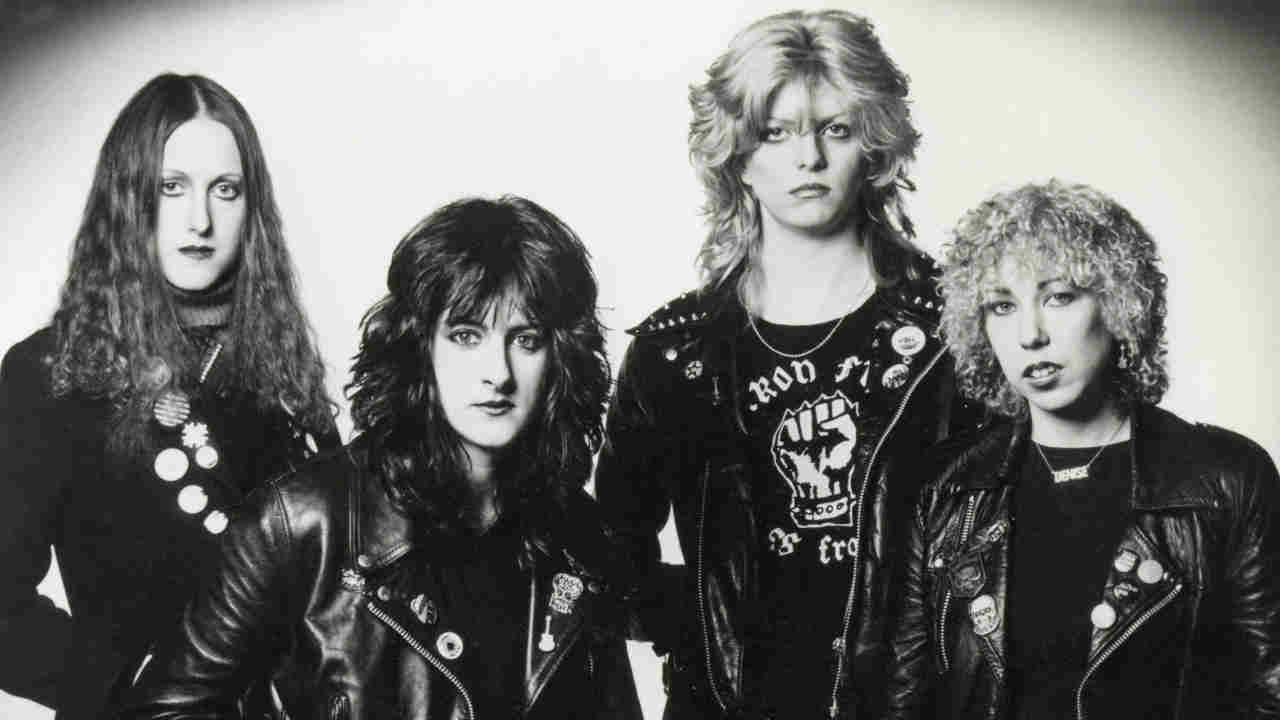Dying Out Flame: Spiritual Healing
Do death metal's core values coincide with Hinduism? Dying Out Flame think so...

In case some of you were still wondering (like, really?) a solid quarter of a century after it had exploded in everybody’s face, death metal has become a worldwide phenomena. Check the Metal Archives website and you’ll see that it has spread like a plague – even some black metal bands from Mongolia, of all places, are listed there. So in a way, it should come as no surprise that even Nepal has proudly joined the death metal revolution. Yet besides its bludgeoning music, a quite frantic mix of Morbid Angel and Nile with its own twist, it’s really Dying Out Flame’s spirituality that really set them apart. There have been instances of extreme bands dipping into Hindu ideology, but ironically so far it has been acts coming from countries where Hinduism is far from being the most popular religion – such as Singaporeans Rudra or Necros Christos from Germany. But Dying Out Flame are the first proper band for which spirituality is part of their every day life, even before they first picked up an instrument. And far from being defined just by its unusually positive lyrical content, their debut Shiva Rudrastakam is just one damn good and solid death metal album. Plus no matter how much enlightenment their bass player and vocalist Aabeg Guatam hopes to convey with his music, the man remains a proud metalhead…
Just a couple of hours prior to publishing this feature, a massive earthquake hit Kathmandu as you now all know and swept clean the city, claiming the lives of over 8,000 people in the process. For about a week, Aabeg was MIA and thus we decided to put the feature on hold until further notice. Thankfully, Dying Out Flame’s frontman gave some more than welcome life signs after eight days, explaining that he had been taken to the hospital after one of his home’s walls fell on him during the tremor. Now homeless, he nevertheless has lost none of his drive to play death metal and has even started working on his solo project…
You can donate to the Disasters Emergency Committee here.
First of all Aabeg, could you give us a bit of background on how and when Dying Out Flame formed?
“I’ve been listening to metal for a long time but death really struck a nerve with me, it has a unique atmosphere and such an extraordinary skull-crushing energy that I knew I had to play it myself. As a result, Dying Out Flame was put together in late 2011 with myself on vocals and bass and Prachanda on drums. Our goal was plain and simple: to play fast, loud and extreme music without restrictions or limitations and fuelled by our undying passion and respect for extreme metal. Until then never played together, we had been good friends for years and always toyed around with the idea of creating something dark and obscure together, and since we had been both bands for a year then, the timing was perfect.
“The first 12 months were a bit rough though as we went through a bunch of potential guitar players until we settled down with Saujanya at the end of 2012. For about five or six months, we remained as a three-piece and played a bunch of shows locally, but soon we realised something was wrong as we sounded way too much like the rest. It had become quite trendy to play this kind of music here, so we decided to try something new, something more positive while still faithful to our roots, hence our concept of mixing Hindu mythology and philosophy, Vedas and eastern classical music.”
Are you the first proper death metal band to come out of Kathmandu? From what you’re telling us, it doesn’t seem so…
Sign up below to get the latest from Metal Hammer, plus exclusive special offers, direct to your inbox!
“Exactly, we’re not the first. I mean, as a band, we’re only four years old and the Nepali underground scene has been witnessing many death metal bands for over a decade now. On the other hand, we are the first band here to fuse this music with Vedic themes, hence our ‘Vedic death metal’ tag. Plus our spirituality also means with we have a certain image that also isn’t the norm.”
Are you the first band from Nepali to have signed to a foreign label?
“We’re not the first one to be signed: UGRAKARMA are about to release 7”s through Legion Of Death records from France and the crossover band X-MANTRA have put an album out through the UK’s King Slam imprint. But we are the first death metal band to put out a full-length on a foreign label.”
Could you say that your Nepali nationality is both a curse and a blessing? It could attract some people’s curiosity, but others might think that you just can’t compete with Swedish or American bands…
“I guess it’s in the eye of the beholder but I personally think that the quality of one’s music has nothing to with his/her own country’s socio-economic status or quality of life. Think what you will but to me playing music is very egoistic, I do it solely to satisfy my need to externalise my inner self and feelings. The stench of money and fame are very far away from what we are doing, we’re here to play some metal and it really doesn’t matter if people listen to it or not because of our nationality. Besides, isn’t it incredibly narrow-minded when one refuses to give music a chance simply because it comes from the wrong country? We all know metal is more popular in more advanced and more tolerant places, in wealthy nations with real medias, music schools, proper venues, labels and so on to back it up. Less accepted places like Bangladesh, Sri Lanka or Maldives also have great bands, it’s just harder to get the message through. So to answer your question, no we’re not worried about our nationality working against us. My simple philosophy is that if you are true to yourself and have faith in what you’re doing, you’ll get noticed at some point.”
Do you think you would have achieved all this without the internet?
“Well, probably not. There’s no doubt that this deal would not have been possible without the help of internet when you are living about 8000km away from everything else. I mean, Metal Hammer did get in touch thanks to that medium right? So yes, the internet has opened up many opportunities for us and for every musician or band, allowing them to extend their networks, reach labels and audience alike – which is something phone calls and letters just can’t compete with. The musical industry landscape, whether it’s underground or mainstream, has undergone a significant transformation since the turn of the millennium due to the internet and I think nothing is going to stop it now. These days, an artist can create a song, upload to a third-party host and share it through social media all from the comfort of their bedroom using little more than a personal computer. More importantly, all cost associated with distribution and promotion have been largely removed through the open communication it offers. I don’t think the internet revolution has necessarily been negative and there’s no any point whining about it and assuming that it has destroyed the music business – seriously, it’s like complaining that cars are going faster than horses! Artists can have a worldwide audience for their music with no corporate participation now due to internet, which is tremendous so what are you whining for?”
Is the name Dying Out Flame related to the concept behind the band?
“Those three words ‘dying out flame’ describe the last phase of the burning of a human corpse. It’s like the last spark of flame of the burning dead. In Hindu tradition, we’d rather destroy the corpse by fire than bury it into ground, it is our way of inducing a feeling of detachment into the freshly disembodied spirit. By leaving no body behind, the point is to encourage it to reach its next destination as we believe that the departed soul will only see its astral body linger as long as its physical self remains visible. This 4000 year old practice of open-air burning is the most spiritually appropriate way to release a soul from the body following death. According to our Hindu culture, cremation is a ritual designed to do much more than dispose of the body, it allows the soul to be released from its earthly existence. As a true Hindu, it’s something we’re being prepared for our whole life as a true believer shall love death as much he loves his life.”
Is Dying Out Flame your way of converting people then?
“No. We believe that every path leads to Him in the end so there is no need to convert anyone as God is one. The name may differ, but ultimately we’re all talking about the same person – people may see him differently according to their ideas but it’s those ideas that matter. Some think that their definition is the right one and is even worth fighting for, hence all the conflict worldwide but there is no need for them, as we feel there’s no need to convert anyone as, once again, God is one. On the opposite side, we think we all should be more tolerant with each other. Besides, I believe that experience is much more valuable than anybody’s personal beliefs as it’s more profound and the only thing that can truly transform us and make us a better person.”
One could argue that Hinduism and death metal simply can’t get together due to their conflicting interests. Do you beg to differ?
“There are other ways to express yourself in that genre of music than through gore, aggression, violence, anti-religious statements and so on. There are some great death metal artists who are die-hard Christians but they mean what they say and their music is still very dark and timeless. Music is not necessarily a means to attack religion or humanity, it can also be about feelings. Everyone should be free to sing whatever they feel like singing as long as they’re doing it with sincerity and dedication, I’ll respect them. I am a spiritually aware guy yet I don’t feel like proving it to the rest of the world. Our music has strong references to the ancient period of Hinduism, it deals with worshipping Hindu deities and Vedic philosophy and mythology. We are proud of our ancestors’ battles, traditions, religion and moral values. Our lyrics praise the lord Shiva and we focus on the positive side of the mind, away from the current anti-religious trend. We’re here to spread the light of spirituality to the whole world.”
Shiva Rudrastakam is out now on Xtreem Music.
